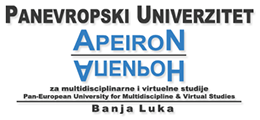 E-Governance in Republic of Srpska - Challenges and Prospects
E-Governance in Republic of Srpska - Challenges and Prospects
Quality of Life (Banja Luka) 3(1-2): 32-40
E-Governance in Republic of Srpska - Challenges and Prospects
DALIBOR DRLJAČA1, BRANKO LATINOVIĆ2
1University of East Sarajevo, Vuka Karadžića 30, 71123 Lukavica, Istočno Sarajevo, RS, BiH, drljacad@gmail.com
2Pan-European University APEIRON Banja Luka, Pere Krece 13, 78000 Banja Luka, RS, BiH, branko.l@apeiron-uni.eu
Abstract: In order to ensure quality of life of its citizens, the European Union member states are in the process of modernisation of their public services through utilization of information and communication technologies (ICT). In this process, each state is selecting own way to meet citizens’ demands for provision of more quality, efficient and flexible public services. One of the main interests of actual Government in the Republic of Srpska (RS) is to protect economic interests of its citizens, as well as to transform its services and functions in order to improve overall quality of life in RS. The implementation of e-Government and e-Governance is one of the main strategic commitments. In order to meet these EU trends, the Government of the Republic of Srpska made first steps in introducing new public services to facilitate communication with its citizens. The Government of the Republic of Srpska recognized benefits of these trends and their impacts on the overall development of society and economy improvement of quality of life of its citizens. With the introduction of these modern services, the citizens in RS should skip lines and shorten the waiting time for response from Governmental bodies related to their requests that will give them more time for other activities.
This paper gives brief analysis of challenges and prospects for implementation of e-Government and e-Governance initiatives, as one of the pillars for successful development of the Republic of Srpska as knowledge based economy and information society with benefits that improve citizens’ life. The paper also gives brief review of main strategic document, which gives governmental vision for implementation, as well as introduction of eSrpska- public administration portal.
Key words: EUROPE2020, Digital Agenda, e-Government, e-Governance, knowledge-based economy, interoper- ability, public services, information society, eSrpska
| Attachment | Size |
|---|---|
| QOL - Volume 3_Issue 1-2 - Dalibor Drljaca.pdf | 601.02 KB |
